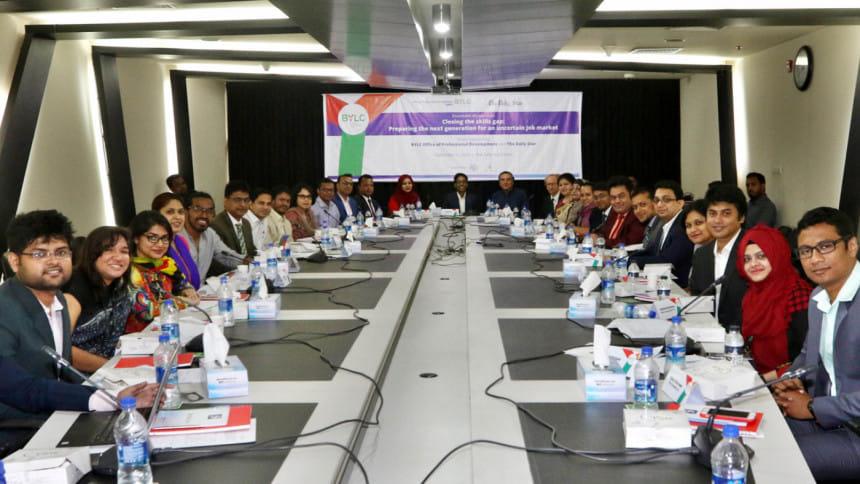Closing the Gaps for a Better Work Environment

Bangladesh has witnessed its best times in terms of economic growth in the last decade or so. Now is the most opportune moment to amplify its growth by efficiently focusing on the skills gaps prevailing at different areas. However, a glaring disconnect between market demands and skills taught at university is contributing to an increasing unemployment rate. A collective role of education institutions and industries is required to bring about a paradigm shift in regards to practicing soft skills and digital transformation.
These topics were explored at a roundtable discussion with nineteen leading HR professionals on "Closing the skills gap: Preparing the next generation for an uncertain job market" hosted by Bangladesh Youth Leadership Center's Office of Professional Development, supported by Aga Khan Foundation (Bangladesh) and Rizwan Adatia Foundation. Representing diverse sectors including banking, insurance, telecommunication, manufacturing, pharmaceuticals, development, and start-up, the discussants scrutinized gaps deep-seated both in education institutions and organisations. They provided insights that are valuable to both young professionals, employers, and fresh graduates who are about to join the job market.
There needs to be better collaboration between education institutions and organisations
Homayara Ahmed, assistant professor at IBA, called for cooperation and recommended organisations to create room for collaboration, training, and mentoring to prepare the new recruits for the challenges of 21st century workplace. The role of the secondary and tertiary education system was given of great significance too. Practice of preconceived notion at institutions make students resistant to new ideas. Teachers across the country must understand the essential skills that students must acquire to fit the volatility of the job market.
Communication gap between different generations hinders organisation goals
A generation gap and difference in thinking and behavior between experienced professionals and millennials at the workplace has created a mismatch in organisational values and strategy. Unmet expectations between them create a confusion in the organisation, leading to short retention periods. Several of the discussants felt that technological advancement with availability of excessive information- without systematic process- is more of a blight than blessing for young people, as they tend to come across as more impressive in their digital personas than in real life.
Emotional intelligence is a requiredskill for the 21st century workplace
Professionals throughout the discussion emphasized that along with having a sound knowledge on their subject matters, young people also need to foster commitment, cultural and emotional intelligence, and humility.Excellence in communication and computing skill had been identified as prior tools to thrive at work place.
Young professional need to have more realistic aspirations at work
Graduates of today are juxtaposed between the realm of aspiration and the harshness of reality.They want it all, they want it now. Sometimes their eagerness for instant gratification deteriorates the quality of their work. Rather than being overly confident, "Employees should understand the importance of cross functional knowledge and be open to fluidity," mentionedMonzula Morshed, Head of HR Banglalink.
Employers have equal responsibility in creating the right environment
Different layers of gapsare evident from organisation's ends as well. Stating the issue of fixed working hour, Munmun Salma Chowdhury from BRAC International said, "Are we creating the job environment that the young people want? We see a lot of resistance to the concept of work from home and flexible working hour. I think higher management of organisations should look into this matter."Time management is a big challenge for Bangladeshi women as they work relentlessly in and outside their home.
Creativity matters
Dipa Reza from Adcommpointed out the additionalstruggles to find the right fit for the creative industry. According to her, a student's passion dies when we discourage him/herto paint, sing or write a poem. She pointed out the unavailability of career counselling services at school level and said, "Career Counselling services should not be limited to universities only. Students from schools need the servicemore to know about the prospects of creative industry in Bangladesh."
Ways forward
By the end of the discussion, some key areas had been identified where Bangladesh could focus on for job creation. As Ragnar Gudmundsson from IMF put it, "It is imperative that Bangladesh diversifies its economy to develop new comparative advantage. Bangladesh needs to expand its investment in human capital through expansion of vocational training and higher education so that there is constant acquisition of new skills."
The discussion ended with a unanimous agreement on bringing didactic reformation in our education system including skill development that benefits each stakeholder from respective ends. Students from the early stages of knowledge acquisition should strive to gain both hard and soft skills and develop the ability to communicate better. Organisations should also open their door to accept diversity and create a room for training and mentoring young work force.

 For all latest news, follow The Daily Star's Google News channel.
For all latest news, follow The Daily Star's Google News channel. 



Comments